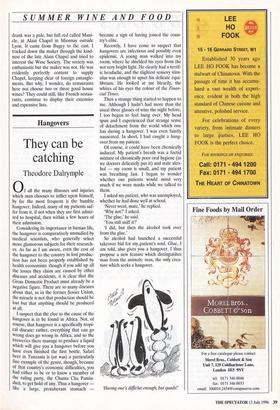Hangovers
They can be catching
Theodore Dalrymple
Of all the many illnesses and injuries which man chooses to inflict upon himself, by far the most frequent is the humble hangover. Indeed, many of my patients suf- fer from it, if not when they are first admit- ted to hospital, then within a few hours of their admission.
Considering its importance in human life, the hangover is comparatively unstudied by medical scientists, who generally select more glamorous subjects for their research- es. As far as I am aware, even the cost of the hangover to the country in lost produc- tion has not been properly established by health economists: though if you add up all the losses they claim are caused by other diseases and accidents, it is clear that the Gross Domestic Product must already be a negative figure. There are so many diseases about that, as in the former Soviet Union, the miracle is not that production should be lost but that anything should be produced at all.
I suspect that the clue to the cause of the hangover is to be found in Africa. Not, of course, that hangover is a specifically tropi- cal disease: rather, everything that can go wrong does go wrong•in Africa, and so the breweries there manage to produce a liquid which will give you a hangover before you have even finished the first bottle. Safari beer in Tanzania is (or was) a particularly fine example of the genre, though, because of that country's economic difficulties, you had either to be or to know a member of the ruling party, the Chama Cha Pamin- duzi, to get hold of any. Thus a hangover like a large, protuberant stomach — became a sign of having joined the coun- try's elite.
Recently, I have come to suspect that hangovers are infectious and possibly even epidemic. A young man walked into my room, where he shielded his eyes from the not very bright light. He clearly had a terrif- ic headache, and the slightest sensory stim- ulus was enough to upset his delicate equi- librium. He looked at me blearily, the whites of his eyes the colour of the Finan- cial Times.
Then a strange thing started to happen to me. Although I hadn't had more than the usual three glasses of wine the night before, I too began to feel hung over. My head spun and I experienced that strange sense of detachment from the world which one has during a hangover. I was even faintly nauseated. In short, I had caught a hang- over from my patient.
Of course, it could have been chemically induced. My patient's breath was a foetid mixture of chronically poor oral hygiene (as we doctors delicately put it) and stale alco- hol — my room is small, and my patient was breathing fast. I began to wonder whether our patients would mind very much if we wore masks while we talked to them.
I asked my patient, who was unemployed, whether he had done well at school, 'Never went, mate,' he replied.
'Why not?' I asked.
`The glue,' he said.
'You still sniff it?'
'I did, but then the alcohol took over from the glue.'
So alcohol had launched a successful takeover bid for my..patient's soul. Glue, I am told, also gives you a hangover. I thus propose a new feature which distinguishes man from the animals: man, the only crea- ture which seeks a hangover.
Having one's d lut enough, but quads!'


































































 Previous page
Previous page